Table of Contents
The Anticipation Builds
Coldplay’s Music of the Spheres tour has ignited a “paradise” of excitement in India, a country where their absence has been felt for nearly a decade. For the band’s dedicated fans, their return isn’t just a concert—it’s the “lights that will guide you home.” For new listeners, it’s a chance to embark on an “adventure of a lifetime.” But make no mistake, this is more than a live performance; it’s a cultural milestone, “written in the stars,” ignited by a modern force we’ve all come to know too well: FOMO (Fear of Missing Out).
In India, where collective experiences like festivals and cricket matches are woven into the cultural fabric, Coldplay’s concert offers something different—a rare occasion to gather around a global music event. The shared excitement has evolved this show into a social symbol. It’s not merely about enjoying live music; it’s about the shared bragging rights of “being there.” Missing out isn’t just a personal loss—it’s exclusion from a broader, cultural narrative. As Instagram feeds fill with ticket hunts, countdowns, and memes, this event has become a rite of passage, where being seen is as crucial as hearing the music. It’s as if everyone wants to “get in line and meet the man who stole the moon,” capturing a piece of this celestial experience.

When more than 13 million people logged into BookMyShow—India’s premier ticketing platform—it became clear this was no ordinary concert. Tickets ranged from ₹2,000 to ₹35,000, catering to everyone from the casual listener to the die-hard fan seeking a luxurious Lounge Ticket experience. But regardless of where your seat is, the real prize is being able to say, “I was there.” In many ways, attending this concert is now more about the story you’ll tell than the songs you’ll hear. It’s a shared experience that has taken on a life of its own.
The Desperate Search for Tickets
Within 30 minutes of tickets going live, they were completely sold out. For fans left in the digital dust, refreshing their screens over and over, it felt like being “stuck in reverse,” with the resale market becoming their only hope. But hope, in this case, came with a staggering price tag. Tickets initially priced at ₹2,000 to ₹35,000 are now being resold at up to ₹10 lakh (approximately $12,000).

It’s a scenario that stretches logic to its breaking point. What would you spend ₹10 lakh on? A car? A luxury vacation? Or, apparently, a Coldplay concert ticket. While ticket scalping is not a new phenomenon, Coldplay’s situation sheds light on the larger issue of unchecked pricing practices in the resale market. In fact, this is part of a global trend, where emotional investment in fandom meets the harsh realities of supply and demand. Fans, driven by a potent cocktail of FOMO and a desire to be part of a “once-in-a-lifetime” experience, have pushed reason aside to be part of something they simply can’t afford to miss.
See what the GenZ folks are saying. Link below.

The Infinity Loop
Coldplay’s Infinity Tickets, priced at ₹2,000 for a pair, seemed to offer a budget-friendly alternative—but even they come with a twist. Seating assignments are revealed only on the day of the event, leaving fans “lost” in a state of suspense. Will they land a prime spot or be stuck in a far-off section of the venue? The uncertainty makes them feel like they’re “up in flames,” heightening the fear of missing out.
Play the video. How many infinity loops (tickets) are there? If you’re able to take a screenshot of all the loops intersecting with the sparkle of hope, you win, guess what—a good read (we hope).
Those who can afford to avoid this uncertainty turn to Lounge Tickets, which promise not just a seat, but an experience—complete with gourmet food and prime seating. In this scenario, FOMO isn’t just about missing a concert; it’s about missing an elite experience that feels like “strawberry swings,” only available to a select few.

Coldplay by the Numbers
The numbers paint the picture of Coldplay’s overwhelming draw. With three shows scheduled at Mumbai’s D.Y. Patil Stadium in January 2025, each performance will host around 50,000 attendees, with another 10,000 in standing room. That’s a total of 1.8 lakh tickets, but with 1.3 crore people vying for a spot, the odds of securing a ticket are just 1.3%.
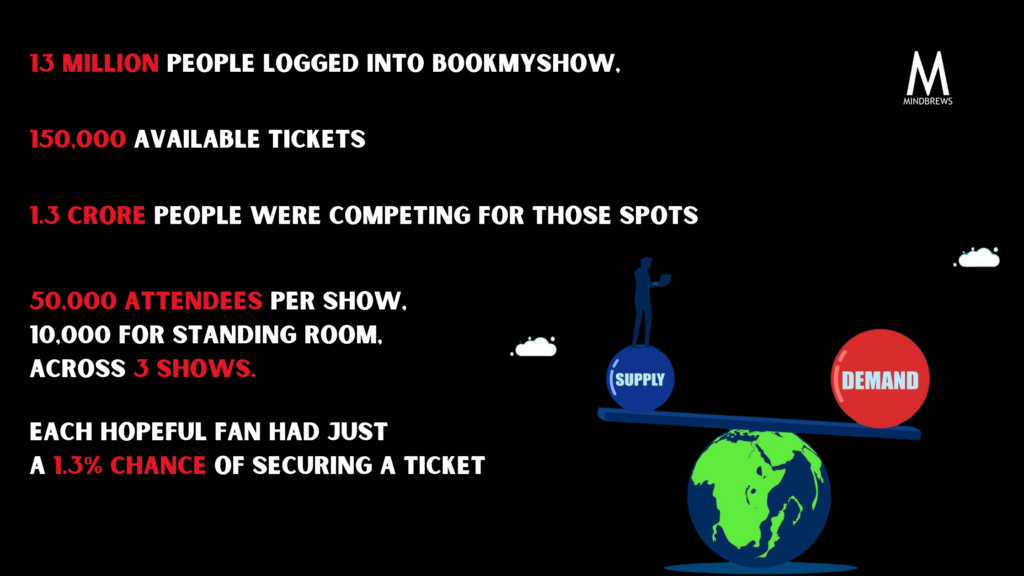
That slim chance has fueled an Instagram frenzy, with waitlist screenshots and tales of disappointment flooding social media timelines. The FOMO isn’t just intense—it’s measurable. The concert is a cultural moment where everyone wants in, but only a lucky few will make it.
The Ethical and Legal Fallout
The ticket frenzy quickly spiraled into an ethical quagmire. Is it justifiable for scalpers to drive ticket prices to such extremes? Ticket resales of this kind are not unique to India; they reflect a global pattern where major events are increasingly dominated by secondary markets. In the U.S., Taylor Swift fans faced similar problems, leading to legal battles with Ticketmaster. Fans already battling FOMO are now caught in a moral dilemma—either pay inflated resale prices or miss out entirely, feeling like they’re “clocks” running out of time.
In India, the fallout led to allegations of manipulation. BookMyShow, the platform responsible for ticket sales, faced a backlash after its website crashed within minutes of tickets going live. Fans accused the company of enabling scalping, with formal complaints filed against them and secondary sellers like Viagogo. Advocate Amit Vyas spearheaded the charge, launching an investigation into these practices. This investigation highlights the intersection between consumer protection laws and the ever-growing secondary market, which can spiral out of control without proper regulations. The Mumbai Police’s Economic Offences Wing is now involved, summoning top executives for questioning. The investigation is ongoing, but the accusations have left a “warning sign” over what was meant to be a celebratory event.

The Power of FOMO
Coldplay’s ability to create a sense of belonging is unmatched. Their music, with anthems like “Fix You” and “Viva La Vida,” has become deeply personal for millions, making them feel like they’re not just fans but part of a “beautiful world.” Some fans, well. These guys (post below) went asking around the neighborhood – how well do you really know the band, and guess what?
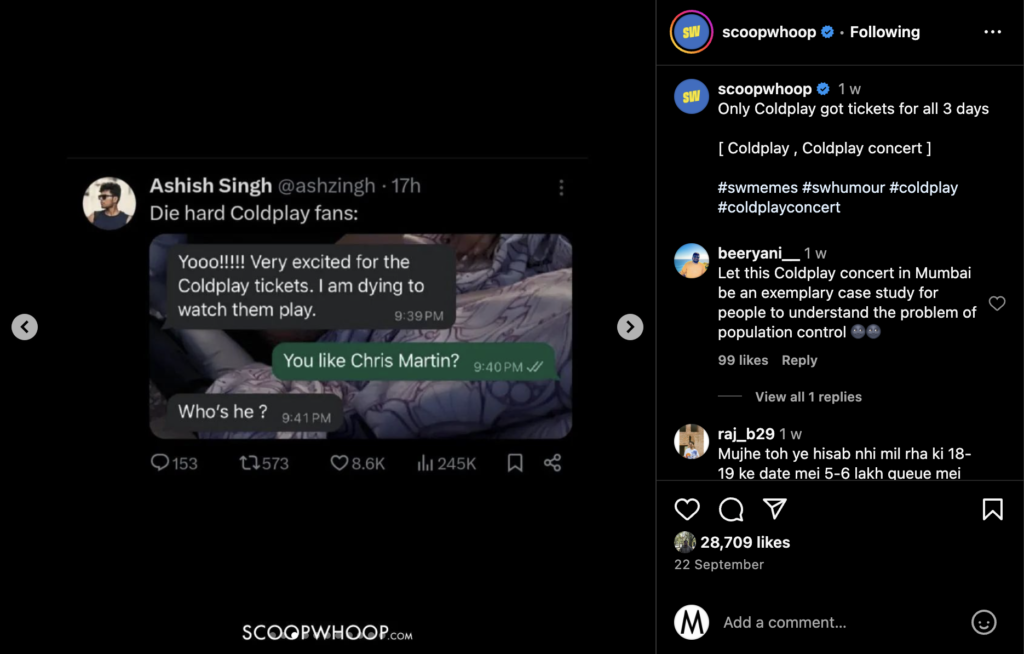
Reflection on Consumer Culture
When Coldplay first ventured into India with their 2016 music video Hymn for the Weekend, they reignited a complex debate about cultural representation. The video, shot in Mumbai during Holi, featured vibrant visuals of Indian traditions, religious figures, and Bollywood-inspired moments with Beyoncé. To some, this imagery felt like a celebration of India’s unique culture. To others, it echoed the problematic tropes of exoticism and cultural appropriation.

In many ways, the video plays into the western music industry’s long history of misrepresenting non-western cultures, particularly India, as an “exotic playground.” India, through the western lens, is often reduced to a spectacle of colors, spirituality, and poverty—a diluted version of a complex and multifaceted nation. This framing overlooks the realities of modern India, instead romanticizing it as a mystical backdrop for western creativity—a place where “every teardrop is a waterfall,” without acknowledging the depth beneath the surface.
Tapping into energies
The band, having a massive following in India, now faces a different kind of cultural engagement—a live, immersive experience that connects them directly with Indian fans. While the 2016 video stirred controversy about how India is portrayed in media, the conversation has shifted. Today, the focus isn’t solely on whether western artists are appropriating culture but also on how Indian fans are interacting with this global spectacle.
Coldplay’s concert taps into this energy. However, it does so in a world where global music events can sometimes feel detached from the countries they visit. As the music industry moves forward, the challenge remains to ensure that these large-scale events do not repeat the past mistakes of flattening cultures into mere visual and experiential backdrops for commercial gain.
Then there also these kind of debates. People who question the economics of affordability in itself. Someone has to talk about it, right.
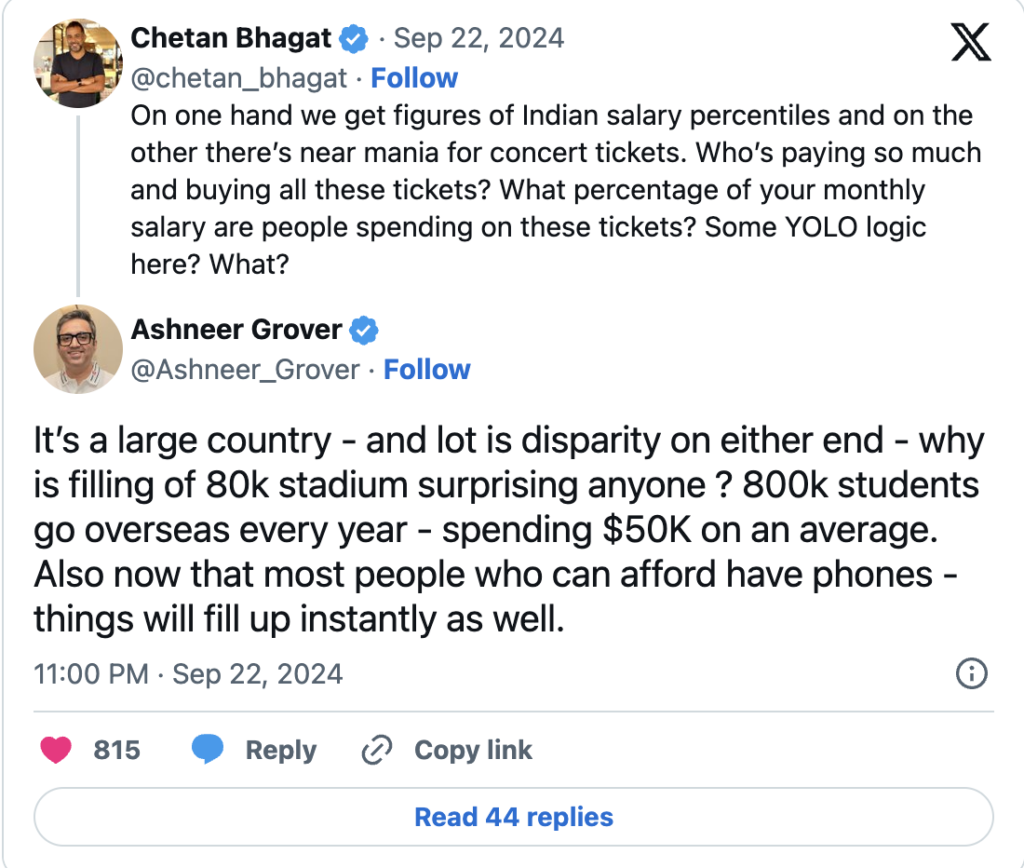
In a world where live events are now status symbols, are we losing sight of the personal connections that music fosters? Are we forgetting to “feel the fear” and embrace the “magic” that music brings to our lives?
Coldplay, known for their energy-filled performances, also integrated themes of sustainability and global consciousness into their tour. From using kinetic dance floors to donating a portion of their revenue to environmental causes, the band created a narrative that resonated with fans not only emotionally but ethically. This only added to the allure of attending their shows, elevating the experience to something that felt both personal and purposeful. And while this is all is happening with the ticket, they are to plan these 5 million trees. Accountability, maybe in the next article – where we’ll see if they actually manage to stay rooted.
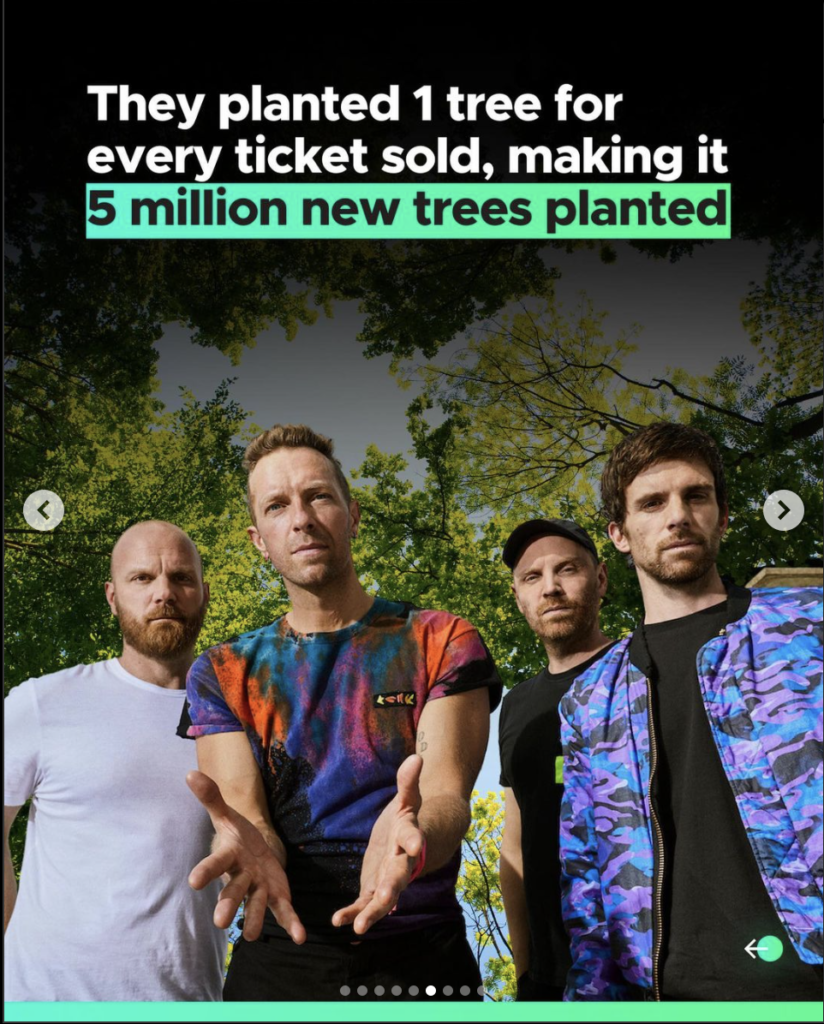
A post shared by Mad Over Marketing (M.O.M) (@madovermarketing_mom)
Coldplay’s Final Act: Fandom’s Price Tag
Since their debut in 1998, the band has sold over 100 million records, reshaping the landscape with their emotionally charged sound. As Coldplay announces their impending retirement from recording after 2025, their legacy takes center stage. It’s as if they’re saying, “we’re diamonds taking shape,” choosing to shine brightly before bowing out gracefully.
With only two more albums planned and a final tour marking the end of an era, the band’s decision to embrace a “less is more” philosophy underlines their commitment to quality over quantity. Chris Martin’s vision of releasing only 12 “proper albums” reflects a desire to “fix” the narrative, leaving behind a focused and meaningful body of work.
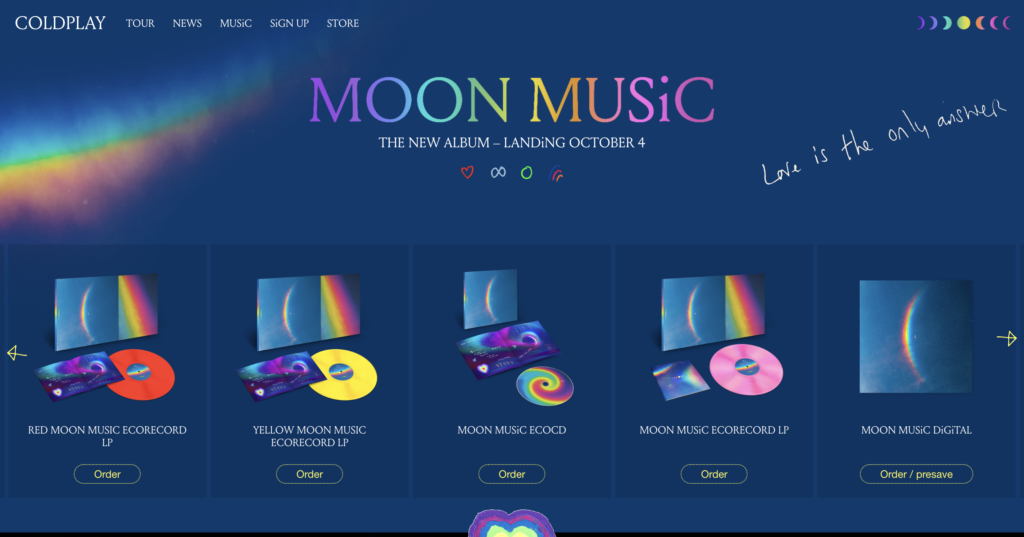
The band’s efforts to champion environmental sustainability—like planting 5 million trees—are admirable, but they raise the question: where does the balance lie? On one hand, Coldplay aims to reduce their environmental impact and leave behind a positive legacy. On the other, their concerts have created a frenzy that leads to financial strain for many fans, as ticket prices soar in resale markets. The money raised, while used for noble causes, comes at a steep cost for those desperate to be part of the experience—leaving some to wonder if they can “climb the ladder” without it “breaking down.”
As Coldplay approaches the end of their journey, we are left to ask: If everything must truly have a limit (according to Chris), where does that limit lie? Can the band balance their social and environmental initiatives with the commercialization that surrounds their performances? And how do fans reconcile their love for the music with the financial realities of being part of such cultural moments?
Coldplay’s influence will undoubtedly endure, but their farewell also highlights the deeper issues within the music industry—where the line between art, culture, and capitalism has become increasingly blurred, much like a “midnight” sky.
What are your thoughts? Have you been part of the Coldplay phenomenon, or are you watching from the sidelines? Share your experiences in the comments below or write to us at [email protected].